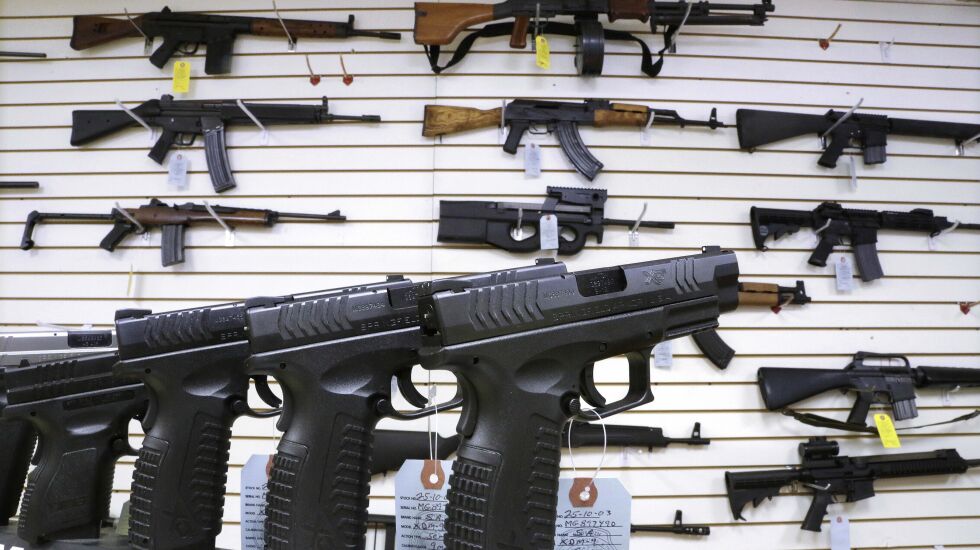
The federal appeals court in Chicago sided Friday with Illinois against legal challenges aimed at blocking the state’s nearly year-old assault weapons ban, finding that weapons covered by the legislation do not enjoy Second Amendment protection.
“Even the most important personal freedoms have their limits,” Judge Diane P. Wood wrote in the court’s highly anticipated opinion.
“Government may punish a deliberately false fire alarm; it may condition free assembly on the issuance of a permit; it may require voters to present a valid identification card; and it may punish child abuse even if it is done in the name of religion. The right enshrined in the Second Amendment is no different.”
The 7th Circuit Court of Appeals found assault weapons and high-capacity magazines “are much more like machineguns and military-grade weaponry than they are like the many different types of firearms that are used for individual self-defense.”
In doing so, it found that Illinois’ controversial gun law survived the first part of a two-step test laid out in a crucial June 2022 ruling by the U.S. Supreme Court. That means the court’s analysis could stop without exploring the nation’s historical tradition as required by the second step. However, the appeals court said challenges to the state’s law fare no better there.
Still, the appellate court cautioned that it did not set out “to rule definitively on the constitutionality of the act.” Rather, the opinion stems from lower courts’ rulings on requests for preliminary injunctions against Illinois’ law.
Among them was a challenge from Naperville gun store owner Robert Bevis. His bid to block the law was initially rejected by U.S. District Judge Virginia Kendall in February. Kendall found that because assault weapons “are particularly dangerous … their regulation accords with history and tradition.”
Many observers expect the issue to ultimately make its way to the U.S. Supreme Court.
Judge Michael Brennan dissented from Friday’s ruling by Wood, who was joined by Judge Frank Easterbrook. Brennan called his colleagues’ conclusion “remarkable.”
The 7th U.S. Circuit appeals court oversees Illinois, Indiana and Wisconsin.
Gov. J.B. Pritzker called the ruling “a victory for the members of the General Assembly who stood alongside families, students and survivors who worked so hard to make this day a reality.”
State Rep. Bob Morgan, D-Deerfield and the chief sponsor of the assault weapons ban, said it had “already prevented the sales of thousands of assault weapons and high-capacity magazines in Illinois, making our state safer.”
Chicago Mayor Brandon Johnson also applauded the ruling, insisting the law will “aid in keeping weapons of war out of our neighborhoods and off our streets.”
Illinois’ law bans the sale of assault weapons and caps the purchase of magazines at 10 rounds for long guns and 15 for handguns. Anyone who already owns the banned guns is allowed to keep them but required to register them with the Illinois State Police by Jan. 1.
Millions of Americans own those guns, attorneys say.
The law was enacted in January in response to the shooting at Highland Park’s 2022 Fourth of July parade that left seven people dead.
The Illinois Supreme Court narrowly upheld the law Aug. 11 in a lawsuit brought earlier this year by a central Illinois legislator who argued the sweeping ban violates the state constitution.
Meanwhile, the federal appellate court heard arguments that led to Friday’s decision in late June. The panel seemed to struggle at the time with the recent guidance laid out by the U.S. Supreme Court.
In that decision, known as New York State Rifle & Pistol Association v. Bruen, the Supreme Court found that gun regulations must be “consistent with the nation’s historical tradition of firearm regulation.”
Opponents of the Illinois law argued the decision forbade governments from banning weapons that are “in common use.” But Wood remarked it was “very troublesome to have a popularity contest decide a constitutional principle.”
Easterbrook questioned one lawyer about whether a Depression-era law against machine guns, following their use in Chicago’s St. Valentine’s Day massacre and other mob hits, was unconstitutional.
“They were especially common in Chicago,” Easterbrook said of weapons like the Thompson submachine gun.
A lawyer challenging the ban replied that Tommy guns were mostly used by “gangsters and mobsters.”
But Wood returned to the question in her ruling Friday, and noted the answer “tells us nothing about how use of those guns would have evolved, had they remained legal and readily available.”







